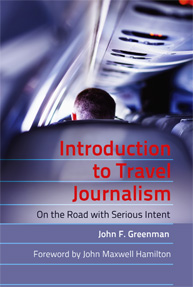Know when it’s time to head home
Posted: September 30, 2012 Contents: Chapter 4 | Tags: know when to go home, matador network, matadornetwork.com, spencer klein, travel journalism, travel writing, traveling home Leave a comment »The three-by-three model discussed in Chapter 4 guides the travel journalist through the process of traveling. Included in the process is the preparation to travel, the reporting trip, then writing and publishing. Matador Network author, Spencer Klein, offers advice to readers on the exact opposite: how to know when it’s time to stop traveling and go home.
When the existential satisfaction of open time and nothingness and learning for learning’s sake gives way to distant thoughts and a yearning for routine, that’s a good sign you want to head home.
Some of Klein’s eight signs it’s time to stop traveling and go home include:
You are rationing salted peanuts, you’ve just sold your pocket knife, and last but certainly not least: you’ve agreed to write a copy for the BuenaVista Condo Development marketing brochure.
From layaway to house swapping: Options for self funding
Posted: September 30, 2012 Contents: Chapter 7 | Tags: budget travel, budgettravel.com, cheap travel, Fran Golden, house swapping, layaway, saving money on travel, travel journalism, travel journalist, travel writing Leave a comment »“How much will it cost?” Is often the first question following an idea to travel. Chapter 7 discusses the funding opportunities for the travel journalist and like Chapter 7, BudgetTravel.com’s Fran Golden investigates unique methods to saving money as a traveler.
The first method is a form of self funding:
Layaway. It’s not just for buying those expensive Christmas gifts anymore. Travelers are able to put down a deposit on a trip and pay continuously until the trip is paid for. Sites like Searsvacations.com, elayaway.com and Gate 1 Travel offer these types of services.
Golden also offers advice on obtaining lodging fairly inexpensively. Sites like homeexchange.com and digsville.com allow travelers to swap homes with a local resident of the desired destination who is also planning a trip to the journalist’s home.
Ask and you shall receive — travel savings
Posted: September 26, 2012 Contents: Resources | Tags: budget travel, budgettravel.com, deanna cioppa, frugal, frugal traveler, travel experts, travel journalism, travel savings, travel writing Leave a comment »One way to save money? Talking. BudgetTravel.com’s Deanna Cioppa advises that simple human to human interactions can lead to discounts on airfare, lodging and cruises.
The author asked several travel experts for simple questions travelers should be asking to save money. Some of the questions include:
- Is there an upgrade available?
- Are you running any local deals?
- Is there a tourism card available?
Some of these questions seem like no brainers but often times travelers forget, are too intimidated, or think its useless to ask them. According to experts, start asking these questions to ensure a more complete, inexpensive trip. Besides, it won’t hurt to ask.
Writing about home as a destination for others
Posted: September 26, 2012 Contents: Chapter 4 | Tags: backyard, karen gibson, stay home travel, travel journalism, travel writers exchange, travel writing Leave a comment »Chapter 4 offers this advice to journalists who wish to write about destinations but cannot afford either the cost or time it takes to travel: write about your home as a destination. But who wants to read about your boring old town, right? According to Karen Gibson of Travel Writers Exchange, many readers do.
One may think that their own backyard is dull and lacks excitement but, as Gibson points out, chances are people that live on a Caribbean island or in Paris probably don’t think their homes are exotic either. The author advises that travel writers do not have to stick to traditional travel publications as outlets for this work work. Rather, look to other publications about lifestyle, retirement, parenting, and food to diversify outlets and increase the chances to be published.
